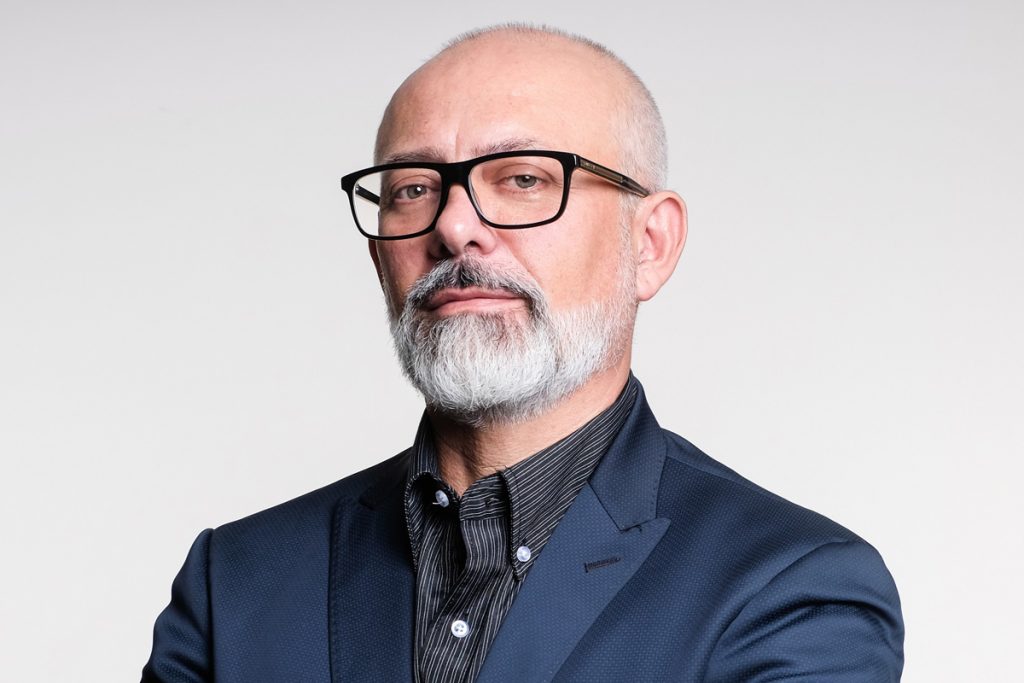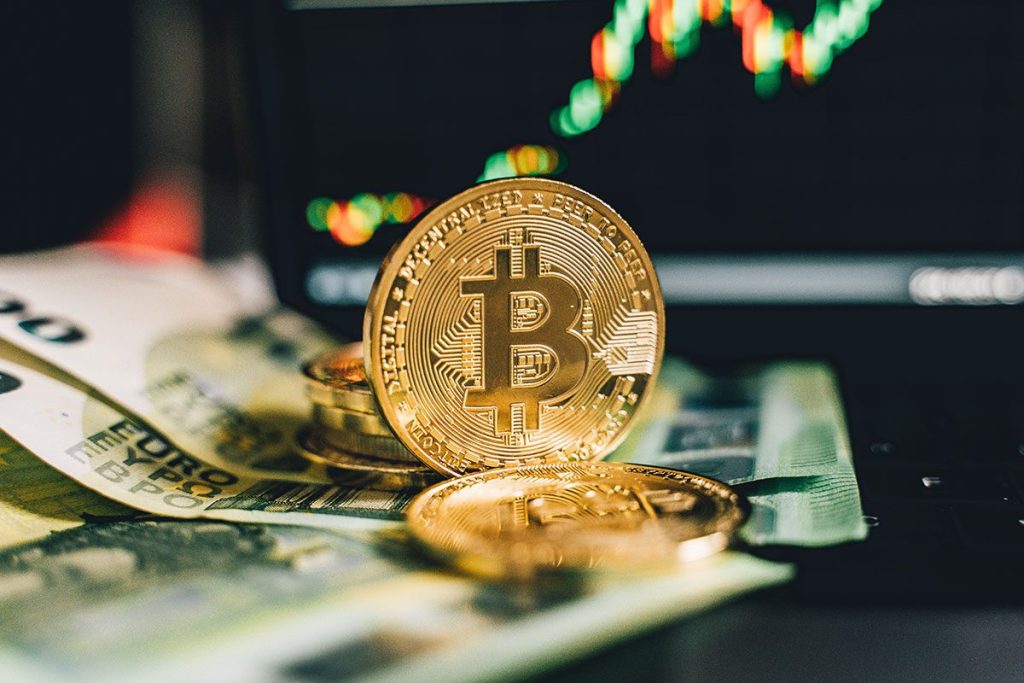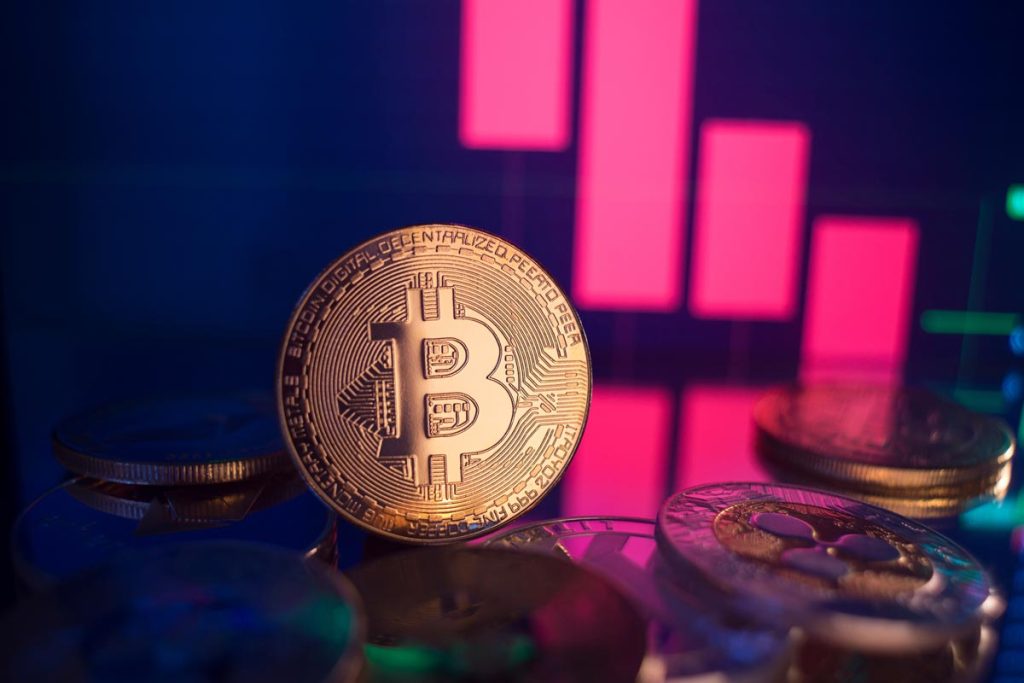Major cryptocurrency coins have recorded extended declines recently – with the global crypto market cap falling below $1 trillion for the first time since January 2021.
Bitcoin, the largest cryptocurrency by market value, has dropped by approximately 65 percent, tanking for nearly 12 weeks before offering a glimmer of hope.
It seems the “crypto winter” has come, with investors, analysts, regulators and other industry players all over the world ramping up discussions on the industry’s frigid blows.
Impact on the Gulf region:
According to Axiory, a global brokerage firm, MENA investors generally tend to be more cautious in their approach to investing, shielding them from massive impact of the recent downturn in crypto valuation.
“MENA investors are very sensitive to volatility and tend to enquire more in regard to the instruments they are considering, especially when it comes to assets which are new, and are not in the pool of their preferred ones,” Axiory CEO Roberto d’Ambrosio, told Arabian Business.
As for the rest of the world, this kind of risk appetite may have contributed to the crypto crash – investors went on a selling spree as inflation bit many economies across the globe.
Like the crypto market, traditional stock markets have also been affected by high inflation with S&P500 and Nasdaq indices plunging more than 20 percent since the beginning of the year.

Here’s an overview of the current crypto market conditions, along with advice from experts on how you can invest in turbulent markets:
- Bitcoin could take months to rally again: expert
- Job cuts and hiring freezes follow crypto crash as Coinbase, Bahrain’s Rain ‘make tough decisions’
- Crypto crashes $1 trillion in five months
- Is there light at the end of the crypto tunnel? Early musings after the market meltdown
- There is a way to invest ‘wisely’ and with lower risk despite the crypto crash, an expert advises
- Investors should choose discipline over ‘drastic action’ because crypto ‘is here to stay’: Expert
- Investing during a period of corrections: How to stay cool amid the panic
- Secrets of success: A 28-year-old crypto millionaire opens up on bitcoin, ethereum, and getting rich
Bitcoin could take months to rally again: expert
Better days seem to be out of sight for the crypto world, which has witnessed some of its worst in recent months – with the turmoil notably led by tumbling digital currencies.
Bitcoin, the world’s largest digital currency in market value, has plunged to around $21,000 on Wednesday morning – losing more than half of its value since November last year, when it traded up to $69,000.
The downfall happens on the back of tightening monetary policy, as well as high inflation rates in major economies around the world.
Its weight “on financial markets and are trickling down into cryptocurrencies through their influence on large institutional investors,” Alex Kuptsikevich, FxPro senior market analyst, told Arabian Business in an emailed statement.
The second most traded digital coin, Ether, also registered significantly dismal losses on Wednesday, trading almost 12 percent lower than the previous day. At $1,066.86, Ether lost 57 percent of its value year-to-date.
Recent developments in the digital currency scene are also playing a major role in this collapse. In mid-May of this year, stablecoin terraUSD and its native coin Luna lost all of its value, causing a major meltdown in the industry. Media reports estimated the scandal cost $500 billion in losses.
Although some analysts remain optimistic about digital assets, it looks like it will take time for another rally for the most popular digital coin.
“We believe Bitcoin may be close to its bottom, but it could take months until the next rally. During those months, the entire crypto industry will probably go through a furnace of fire,” Kuptsikevich said.
Crypto regulation in the Middle East
These market news are also sparking conversations about the general credibility of cryptocurrencies, especially when it comes to mainstream adoption.
In the UAE, a few major companies have recognised digital currencies as a mode of payment, including Emirates and Al Futtaim.
“Regulation is necessary and the UAE is one of the fastest countries in the world in terms of moving towards regulation,” Dubai-based crypto expert Jamil Abuwardeh told Arabian Business, noting mainstream adoption could slow down given the recent industry movements.
Another reason why regulation is important in the industry is to better crackdown on cyber threats. In a recent report by Kaspersky, data showed there were nearly 200,000 phishing attacks specifically against digital wallets used to store crypto coins in the first quarter of 2022. Fraudsters would mimic crypto wallets’ websites and lure victims to enter personal security information.
These attacks were observed in many popular crypto wallets, including Binance, one of the biggest in the world in number of users, Coinbase, and eToro, the report showed.

“Phishing crypto scams deserve special attention – because they’re based on social engineering, these attacks do not require any advanced technical skills to be launched and work well for the fraudsters. They are often successful due to a user’s inattention and lack of awareness,” Alexey Marchenko, head of content filtering methods research at Kaspersky, said.
Much emphasis has been put on individual education for crypto enthusiasts to learn how to protect themselves from digital threats, especially as cryptocurrency gains more traction with apparent government and institutional backing.
Dubai authorities have actively been announcing efforts to combat crypto fraud, specifically in ensuring better regulation of virtual assets in relation to money laundering. Earlier this year, the Dubai government set up the Virtual Asset Regulatory Authority to deliver on this goal.
Job cuts and hiring freezes follow crypto crash as Coinbase, Bahrain’s Rain ‘make tough decisions’
Crypto firms in the Middle East and across the globe have begun to cut jobs and put hiring on hold as ripples of the cryptocurrency market crash spread across the globe – with Bitcoin falling more than 50 percent to less than $33,000 and the global crypto market shedding more than $2 trillion.
Rain Financial Inc, which is one of the Middle East’s largest crypto exchanges, has laid off dozens of employees amid a recent downturn in digital assets, Bloomberg reported.
The job cuts at Rain come as Gemini Trust Co, the crypto business run by billionaire brothers Cameron and Tyler Winklevoss, slashed 10 percent of staff.
Meanwhile, Coinbase Global Inc said it will extend its hiring freeze for both new and existing positions for the “foreseeable future” and rescind a number of accepted offers.
“As cryptocurrencies and global markets continue to slow down, this has in turn impacted businesses across the globe,” Joseph Dallago, co-founder and chief executive officer of Rain told Bloomberg said in a statement.

“We have had to make tough decisions to be able to navigate through this period of uncertainty and we can confirm we have downsized our Rain workforce.”
The company communicated the decision to staff this week. The cuts impact employees across a range of departments, Bloomberg reported.
Impact of the crashing crypto market
Cryptocurrency prices have declined this year from the highs reached in early November.
Rain last raised funds at a $500 million valuation, pledging to use the money to expand in the Middle East and Africa and double its workforce to 800 this year.
The largest US cryptocurrency exchange cited market conditions and ongoing business “prioritisation efforts” for the decision to cut jobs.
Meanwhile, some Wall Street analysts have warned that Coinbase’s costs are too high. The company has ballooned to 4,948 full-time employees, from about 1,700 just a year ago.
Hiring helped drive the company’s total operating costs to $1.7 billion in the first quarter, up 9 percent from the previous three months.
In a memo to employees on May 17, Coinbase’s chief product officer, Surojit Chatterjee, said the company will be increasing its focus “on critical revenue-generating products” by doubling down on core products while seeking improvements in developer productivity, Bloomberg reported.
Coinbase has gone from one of the stock market’s most hotly anticipated debuts to one of its most spectacular crashes in a little more than a year.
The firm’s market value has shrunk by about $50 billion since the end of its first day of trading last April, Bloomberg reported.
Shares of Coinbase fell to an all-time low in May, and even after recovering somewhat are still down about 80 percent from their debut.
The stock rose 7.6 percent to $73.82 on Thursday, and was little changed in post-market trading.
Crypto crashes $1 trillion in five months

With the total crypto market cap falling by $1 trillion on a year-to-date basis, the future of cryptocurrencies as the “new age digital asset” has been called into question by numerous experts.
Top cryptocurrencies such as Bitcoin and Ethereum are down between 45 percent and 55 percent ahead of other significant altcoins such as Cardano that are down by more than 60 percent.
While rising inflation and geopolitical instability caused by the Ukraine war “could be partly to blame”, there’s a lot more behind the crypto crash.
Market panics leads to recent selloffs
The global market is also witnessing a move away from risk-on assets such as tech stocks and cryptocurrencies due to the actual and perceived increase in interest rates by central banks around the world.
“Within the cryptocurrency market itself, the recent collapse in the value of Terraform Lab’s algorithmic stable coin and the Luna Guard Foundation’s inability to protect its dollar peg have frightened the broader cryptocurrency ecosystem,” said Amir Tabch the CEO of Securrency Capital.
In addition to the macro-economic factors, “the most recent selloff has also been influenced by the fall of various stablecoins. These are cryptocurrencies that support their crypto assets by controlling the equivalent in real world assets, meaning they should never really trade for under $1,” Mohammed Shaheen, the CEO of Seven Capitals, added.
The chief investment officer of Century Financial, Vijay Valecha, said: “With Nasdaq 100 down by 25 percent year-to-date, the ongoing drawdown in US tech stocks has created an atmosphere of fear and panic. To make matters worse for the crypto markets, the Terra Luna stable coin debacle has spotlighted the major cons of using blockchain and cryptocurrency as the new age asset.”
Impact of inflation and corresponding rise in interest rates
Does this mean that investors have begun to question the basic fundamentals of blockchain and smart contracts that underpin the blockchain ecosystem?
Christopher Flinos, the CEO of Hayvn, added: “Rising interest rates since increased size of the crypto market has led to increased correlation.”
The UAE Central Bank (CBUAE) decided to increase interest rates for the second time this year, following the US Federal Reserve’s move to increase the interest on reserve balances (IORB) by 50 basis points for the first time since 2000 in order to curb rampant inflation.
While on one hand this move has raised concerns around the volumes of crypto due to its impact on liquidity and the opportunity cost of investing in volatile assets, the market is also witnessing investors reacting to the negative sentiment around higher borrowing costs affecting the risk-reward of crypto investments.

Responding to whether this “panic” in the crypto market is likely to continue, Flinos said: “Yes it will. We expect a difficult few months ahead which gives our asset managers an amazing opportunity to trade off this volatility.”
Keep a ‘cool head’ through the ‘fear’
This brings to the forefront the possibility of untapped opportunities for those who can keep a ‘cool head’ in the midst of the frenzy.
Shaheen explained: “This asset class has always been volatile and such crashes have happened before – in 2021 and in 2017 – and it has bounced back to all-time highs. Investors should hold on to their investments and focus on long-term goals.
“Whether the crypto slide continues remains to be seen. However, there are chances the bear market will continue as investors remain cautious about buying on dips.”
One of the major precursors for crypto price stabilisation and recovery would be a recovery in US tech stocks. Currently, the trend visible across these assets is “sell on rise”, experts said.
Valecha said: “Markets have very well not yet reached the stage of peak fear. This likely implies more volatility and possible correction across these risk assets.”
Will crypto such as Bitcoin and Ethereum pull off another comeback?
Clearly confidence is shaken and people are in no mood to take on risk, but will the market weather the storm, and rise again?
Shaheen responded: “It is not game over yet. Bitcoin has survived corrections of 70 percent to 80 percent in the past. The cryptocurrency rebounded at the tail end of last week to top $30,000. On Monday, it was trading at $30,279.13. Some big players could take advantage of the recent dip, as an opportunity for institutions to build positions at better levels.”
Yet, this is not necessarily good news for cryptocurrencies either. From their November 2021 peak, Bitcoin and Ethereum are down by more than 60 percent.
From a significantly broader time perspective – from the start of the bull cycle, March 2020 to date, Bitcoin is up by 650 percent, whereas Ethereum is up by 2,300 percent.
“These cryptocurrencies are already discounting the major negatives often associated with cryptocurrencies. The entire notion of it being an inflation hedge and acting as a digital gold has been negated. Due to its ongoing correction cycle, bottom fishing and dip-buying could go against the investor’s average buying positions,” Valecha said.
“Chart technical and underlying crypto market trends point towards a bleak outlook. While the amount of drawdown currently being seen in Bitcoin and Ethereum suggests an excellent opportunity to enter, investors in this space are well advised to watch out for any signs of stabilisation in US equity indices and the broader crypto markets before entering into any major positions.”
Is there light at the end of the crypto tunnel? Early musings after the market meltdown

Industry analysis and predictions have inundated the internet as cryptocurrencies faced stronger headwinds in recent days – major digital coins are falling, exchange platforms are downsizing, and macroeconomic factors continue to put pressure on the industry.
While the conversation is rife with stories of billions of dollars in investment losses – others are asking a more forward-looking question: what can we learn from this meltdown?
One blockchain expert in Dubai said these recent industry developments “highlight the ever-increasing importance of having clear and effective regulation for digital assets.”
Luckily for the UAE, Mohammed Altajir, a custodian of UAE-made digital currency “Tratok,” said the country was “fast to pick up” on regulation.
“Regulation will become more vital as mainstream adoption increases daily, a fact that the UAE was fast to pick up on and lead the world in setting up a regulated ecosystem to encourage development of value-adding blockchain innovations,” he explained, adding the latest news could encourage other regulators to follow the UAE’s example.
The price fluctuations, however, are nothing new, Altajir said, as the industry has already gone through many volatility cycles in the past.
Bitcoin was first launched in 2009, but it only picked up in 2017, with its value reaching up to around $19,000 by year-end. Its meteoric rise was reversed in 2018, when it hit its post-peak bottom in December of that year at $3,000 – losing more than 75 percent of its value.

Altajir said the “fundamental use cases for the adoption of blockchain technology remain strong and supported,” hoping the recent industry movements could shed light on the underlying technology behind digital currencies.
“Expect a lot more emphasis to be placed on real world application going forward and less to be place on hype and speculative vapourware,” the Dubai-based blockchain advocate said.
He added: “The industry still remains in infancy and I believe that these recent developments are just another lesson that the world will learn from as it continues to embrace the blockchain revolution.”
Bitcoin was still trading lower on Friday at around $21,000, and Vijay Valecha, chief investment officer at Dubai-based consultant Century Financial said the “euphoria an buzz surrounding digital assets have vanished as the bull cycle is about to wipe off completely.”
“The current selloff is a classic example of volatility begetting more volatility. The selling pressure has yet to reach its peak climax as massive liquidations still occur in the DeFi space,” he told Arabian Business.
Another financial markets expert said the market is due to consolidate, with the “vast majority of existing coins” disappearing, “along with the hype schemes based on unrealistic growth expectations.
Roberto d’Ambrosio of global brokerage firm Axiory said this market movement “closely resembles” the “dot com bubble,” where many Internet companies crashed and practically disappeared.
“We all know how it ended: those companies that had substance survived, after falling up to 80 percent off their highs, and made a remarkable come back over the subsequent years,” he explained, adding “All the rest disappeared, not even their name survived.”
There is a way to invest ‘wisely’ and with lower risk despite the crypto crash, an expert advises

Despite the market volatility, and the recent dips that the cryptocurrency market is facing, investor interest in digital currency remains high, especially in Dubai.
Nick Saponaro, the CEO of digital exchange platform Divi, said the emirates remained ahead of the globe in its response to cryptocurrencies, also giving tips on how to mitigate risks and invest wisely.
“Because Dubai is the city of the future, and everybody is looking to be at the forefront of the next big thing, people are at least more receptive to crypto,” said Saponaro.
“There’s a lot of crypto millionaires and billionaires here that are establishing companies and building new projects but I think even those who are unfamiliar with crypto are getting into it, or are even more receptive to what it is and what it can become, versus other countries. For example we were in Spain in November, and they’re just getting started with crypto and are still a little bit averse to it, thinking it’s a scam or money laundering,” Saponaro explained.
“Meanwhile, this city is just full-on embracing it and trying to make the most out of it, even establishing new guidelines and laws that make it easier for people like us to come and build businesses. That’s what I love Dubai, because I feel like everyone I meet is crushing it. And I was like, I’m not crushing it as hard as them and I need to. It’s inspirational,” he continued.
An only child kid who grew up on the East Coast and was always into technology, Saponaro joined Divi in 2017 and was appointed CEO eight months ago.
In its essence, Divi’s philosophy is to make cryptocurrencies “accessible and easy to use for anyone to pick up – not just the tech-savvy people, or the people who are sophisticated investors, but the grandmother, or someone in the sub-Sahara. Everyone,” explained Saponaro.
The digital currency exchange is waiting on a pending patent on a solution which allows users just to click a button and start earning coins through Divi’s wallet.
“Outside of all of the misnomers, propaganda, competing agendas and narratives [circulating against crypto], it’s really important for us, to create a familiarised ecosystem that makes it simple, and something that you can understand right off the bat,” said Saponaro.
“The value chain of finance right now is heavily fragmented where you have all these wallets and coins so it becomes overwhelming and confusing. If we can bring all of that into one place and push the complexity to the background, because none of it really needs to be apparent to the user, the user just wants the outcome they want so you just give them what they need.
“It’s not just about storing money anymore: It’s about accessing this whole universe of finance. So we want to bring all of that into one place, and eliminate a lot of the friction that is caused by both the fragmentation and the over complexity that comes up,” he continued.
Trading securely
Divi’s crypto wallet was launched in October and already has have 25,000 grass-root users. And while ease of use is important, Saponaro also brought up the security element, comparing wallets like Divo to centralised services.
“Basically, you have a choice to make as a developer, you can make sacrifices to get to that ease of use quicker and we see that with some of the centralised services where your money is not held by the individual but by custodial service that they’re using; you’re just recreating a banking system essentially, which is antithetical to what crypto is built around,” he said.
“As developers, we don’t think that sacrificing security for convenience is necessary. We made a lot of sacrifices as humans already with a privacy with social media for the convenience so we shouldn’t give up control of the last thing that we have control of which is finance.”
“You have a responsibility as a developer who does understand what this technology can do to build a service that protects the user, and is easy at the same time. Don’t just try to get to market as fast as possible. Because if we just turn around and recreate the same system with a different face, then we’ve really gotten nowhere,” continued Saponaro.
Investing in cryptocurrencies
Not all cryptocurrencies are created equal and some make more solid investment sense versus others deemed to be riskier.
“You look at the fundamentals of each coin that you invest in and obviously, Bitcoin has the strongest fundamentals of any coin out there: It’s the longest running, it has a lot of institutional support and it’s very unlikely to disappear; there’s no central authority, so it can’t really be shut down. Then it kind of goes down from there,” said Saponaro.
“There’s a lot of high-risk assets like meme coins and things like that, that might earn you a high yield if you’re lucky or get in early enough. That’s gambling, full stop gambling.
“It’s the top probably 300 that have a majority of the market cap and after that the trickle down is so negligible that it’s not even worth tracking. Of course, it’s the top 50 that are going to hold a lot of value because then you have large-scale institutions and its operating more like the traditional financial market in that level,” he explained.

Divi recently entered into a three-and-a-half-year partnership with Spanish professional football league La Liga in the MENA, Southeast Asia and China regions.
“One out of every six La Liga viewers owns crypto so we want to increase that number. As we’ve talked about, there’s this natural aversion to new things or things you don’t understand, so with the La Lega partnership, we’re actually able to get on the ground with fans and show them, for example, how you can buy a beer with the Divi wallet,” he explained.
Asked how Divi makes its money, Saponaro said they have several different revenue streams, including software-as-a-service products such as its staking service, Fiat on-ramp and off-ramp, trading.
“Things like that all generate fees and those help the bottom line to some extent, but what we really make money from is integrating our system with other enterprises,” he said.
“Every single business in the world will have some element of crypto integrated with it at some point. It’s just the same as every business eventually had a website and eventually had a social media, eventually an app. These things happened because customer demand. For us being with La Liga has definitely opened a lot of doors to those enterprises and many of these exchanges and other high tier businesses in crypto’s primary revenue stream is not the retail customers but the business clients,” continued Saponaro.
Investors should choose discipline over ‘drastic action’ because crypto ‘is here to stay’: Expert
With the total crypto market cap falling by $1 trillion on a year-to-date basis, panic is on the rise but co-founder and CEO of MidChains Basil Al Askari assures investors that all markets go through cycles and that “crypto is here to stay.”
In an exclusive interview with Arabian Business, Al Askari warned investors against taking any “drastic decision” and instead to use this period to make smart investments such as dollar cost averaging their portfolio.
Al Askari also discussed the role of regulatory bodies in digital currencies and commented on the growing trend of financing a variety of expenses, from real estate to even meals, with crypto.
Is this the end of cryptocurrency or just your regular market volatility? In other words, should people panic?
Markets have always gone through cycles throughout history and this is not different, it’s just been some time since the last one.
The recent crypto price action is part of a larger macroeconomic market correction across multiple asset classes including equities with the exception of a few outliers like Terra (under investigation by authorities internationally).
It’s important to remember not all cryptocurrencies should be treated equally as they have very different levels of maturity and economic profiles.
Investors should always do their due diligence before deploying capital in both the assets they are seeking to invest in and the service providers they decide to use.
Although crypto historically was less correlated to the wider markets, as more institutional capital enters the arena the more correlated the asset class will tend to lean.
Globally we are facing the first potential recessionary cycle in a decade due to many factors including rising interest rates and inflation across major fiat currencies.

People should never panic, but rather view this part of the cycle as a time to make smart investments like dollar cost averaging their portfolio at a risk level they are comfortable with.
Bitcoin continues to remain the dominant cryptocurrency and many economists view this asset specifically as having the future potential to become a digital standard for benchmarking value, much as gold was before the implementation of unbacked (Fiat) currencies.
We can also draw some parallels to the early days of .com tech stocks which had to go through many cycles before some emerged as the most highly valued companies on the planet. It’s still very early days for crypto and although it’s likely we will see more volatility in the short term (as with the rest of the market) the long-term outlook is still very positive.
When do you expect the market to regulate? And what is your outlook for the rest of 2022? How do the regulations set up in countries like the UAE or Saudi Arabia impact global investors?
Several markets already regulate crypto directly. In the UAE, ADGM (free zone) was the first and more recently VARA (DWTCA free zone) and DIFC (free zone) have begun to take a more active role in the space; SCA (onshore federal) will likely also release a framework this year.
More broadly, Bahrain, Gibraltar, El Salvador, Singapore, Malta, Switzerland, UK, Canada and others are actively regulating crypto service providers and issuers.
Crypto is here to stay, the best thing for the overall health of the market and to protect investors is for balanced and thoughtful regulations to be put in place internationally since for the first time we are looking at a truly borderless asset class.
Given recent events (i.e. Terra) regulators may prioritise the development of regulation for crypto more globally (i.e. US and Saudi Arabia).
Crypto has proven to be a highly demanded and resilient asset class, the best thing for the overall health of the market and to protect investors is for balanced and thoughtful regulations to be put in place internationally since for the first time we are looking at a truly borderless asset class.
Though this might take several years to develop, regulation will be focused on areas such as KYC and AML, market abuse, and legal protections for investors for certain risks.

How does the ability to increasingly use cryptocurrencies to finance real estate investments or pay for meals etc. impact the concern people have over market fluctuations?
At this stage these use cases are not material enough to impact the overall market relative to investments and trading activities.
Over time many believe usage of crypto for payments and cross asset investments will increase overall market adoption of the asset class and should eventually have a positive impact at scale.
What is the recommended time investors should wait before making any major decisions? Is there a solution besides this for concerned investors?
Investors should never make drastic decisions. It is important for investors to always remain disciplined and use the wide variety of resources available to analyse and make rational decisions based on their own risk appetite.
No investment is without risk, but also indecision carries its own opportunity cost.
When making investment decisions there are a few basic principles investors should always follow: Measure your comfortable risk level and time horison, do your due diligence, maintain a diversified portfolio to hedge your risks and remember – it’s not gambling.
Investing during a period of corrections: How to stay cool amid the panic
Sensible investing is an incredible mechanism to accumulate wealth over time, but it doesn’t come without risk. Volatility is the price we have to pay. And patience is the game we must embrace, says Arjun Mittal, founder and chief investment officer at Abbey Road IG Multi Family Office.
Easy to say, hard to achieve. Even though I have close to 25 years of investing experience, the last few months have even tested my conviction on several occasions. This is definitely one of the most brutal asset price corrections in the last 20 years.
There has been no safety ground, with equities, bonds and anything speculative like cryptocurrencies all suffering drops. How does this all end? And what should we do in the meantime?
I wish I had clear answers to these questions. If I did I would gladly share them with you. The truth is I don’t know for sure, but history does have some important milestones for us to consider.

Since March 2009 (the stock market low following the financial crisis of 2008), the S&P500 which is the broad gauge of US publicly listed companies is up 600 percent. But during this time there have been 30 dips of more than 5 percent, 9 drops of more than 10 percent, 3 corrections of more than 20 percent and 1 collapse of more than 30 percent (March 2020 Covid panic).
So corrections are part of the process by which financial markets continually re-adjust to the risk and rewards it sees in front of it.
We are clearly in a risk-on mode. Central banks across much of the world have to battle high inflation. The key tool they have to do this is to raise interest rates.
The dual combo of high inflation and rising interest rates raises fears of less money in our wallets to spend and also a lower purchasing power of that money.
Or in other words we have less available to spend and even that which we buy costs more. This could all end up in a recession which is bad for profits and sentiment.
No wonder financial markets have been spooked. I think it is fair to suggest that we should expect more wild swings until the US Central Bank’s (the Fed) struggle to beat inflation has been resolved.
But there are also rewards we can look forward to. The re-adjustment by financial markets means many good companies now have their bonds and equities priced on the cheap. And this is where some form of investment discipline can help.
To use Warren Buffet’s famous example, if an item you wanted to buy yesterday is now 30 percent cheaper today, you would probably look to buy it without hesitation. So the same concept can apply to good financial assets.
I use the word ‘good’ because it is important in such an economic environment to separate investing from speculating.
Buying the bonds or shares of a company which is indispensable to modern day living (like Microsoft for example) makes sense to me. But buying shares of a company or crypto coin which really doesn’t not have an established use case doesn’t mean it won’t fall further.
Just because something has fallen 70 percent doesn’t mean it can’t fall another 70 percent if it is either still expensive or has no legitimate customer base.
At times like this, it pays to sometimes also take a step back and see the bigger picture. In my mind, the bigger picture is that the majority of 7 billion people still wake up every morning looking to be productive and create/contribute towards to economic activity.

This force will surely, as it has on all previous occasions, eventually lead to the end of selling and the start of a fresh growth cycle. I see no reason why growth, economic optimism and progress will not return. My guess is it will do so sooner than we expect currently.
But even if it takes longer than we would want, good assets selling at cheap prices are never a bad investment.
I still believe sensible investing is an incredible mechanism to accumulate wealth over time, but it doesn’t come without risk. Volatility is the price we have to pay. And patience is the game we must embrace. Stay cool amid the panic.
— Arjun is Founder and Chief Investment Officer at Abbey Road IG Multi Family Office, an independent advisory firm. He has worked in the financial industry for over 20 years across senior roles in London and Dubai.
Secrets of success: A 28-year-old crypto millionaire opens up on bitcoin, ethereum, and getting rich

It was upon the advice of his 62-year-old father, a former pilot with Emirates, that Jack Skipp first invested in Bitcoins in 2017.
A few years, and some setbacks, later and Skipp is now a millionaire, better known as Crypto Jack, with a YouTube channel where he shares his investment journey and advice with thousands of subscribers.
“Before I started in crypto, I was doing my training to become a pilot and had to save some money for the next portion of training. So I created a business which I then was lucky enough to sell for $20,000, all of which I invested in Bitcoin,” said Skipp.
“It was my dad, a retired pilot, who told me to get into crypto. Throughout his life, he was investing in different things and had invested in crypto a few months before I did. I did around a half-day worth of research before deciding to invest all the money I made selling my company into Bitcoin. Crypto was my first-ever investment,” he said recalling that the $20,000 he had was enough to buy him ten to thirteen bitcoins back then.
It was from that experience that Skipp “jumped into the rabbit hole of bitcoins and crypto, doing forums and YouTube videos,” he said during his interview on the Spencer Lodge Podcast. He started his own YouTube channel soon after, making money from ad revenues, then sponsorships and affiliates.
Crypto-investment advice
Looking back now, Skipp would not recommend that first-time crypto-investors put all of their money into digital currency investors from the get-go.
“Although it worked out well for me, looking back it was not a smart thing. What I tell new people in crypto is to buy $10 or $100 worth of digital assets, an amount which you don’t care if you lose,” said Skipp.
“This brings you into the ecosystem, allowing you to see what it feels like to have it in your wallet, what kinds of different wallets there are, buy, sell etc. You can learn a lot more just by doing it rather than watching or reading about it and if you don’t like it or it’s not for you, all you have lost is a minimal amount,” he continued.
Another way Skipp recommends newbies to explore digital currencies is through NFTs to get “a deeper understanding and I can guarantee that once people put in a little bit of money in, they are going to want to put a bigger chunk.”

For beginner investors, Skipp recommends sticking with Bitcoins and Ethereum before venturing into the hundreds of digital currencies out there.
“Once you have understood those and put some money in them, then you can start looking at other digital coins. Do your research first but if it’s outside the top 20 or 50 [coin types], it becomes more risky,” said Skipp.
“But that’s also where you can have the real kind of game. For example, what happened with the early investors in Solana [a type of cryptocurrency] who purchased it at only a few dollars and made thousands of percentage points’ gain,” he continued.
Skipp estimates that there are more than ten thousand types of coins but that “less than a thousand have real significance.
“When there are so many types of coins that all want a slice of the pie, only a few of them will survive the next ten years. I would say around 80 percent of them will fail long term so identifying the right one to invest in is difficult,” he explained.
Skipp believes cryptocurrencies are here to stay, and said that regulatory bodies will not “stunt its growth. I think regulation on the long term will be good and I am on a board working with Dubai Government to shape the law of crypto.”

Calling Web 3.0 “the future,” Skipp said there is a “big money” in the metaverse although it is still in its early stages.
Skipp said he’s made over $10 million in cryptocurrencies over the past two years – because he didn’t make that much money at first – but cautions that his story is not typical.
“Probably 99 percent of people who want to do like me will fail – it is just what it is and there are a thousand different ways they can fail. That’s why I tell people not to put everything in at the same time until they understand it more,” said Skipp.
“I am honestly not happier now than I was five or six years ago when I lived in a shared apartment when I was at school. When you see people buying a new fancy watch, home or car, you have to understand that once you bought this, it becomes the new norm, the feeling wears off. I am not significantly happier getting a new Ferrari than someone is getting a new Audi, it’s the same feeling” he added.








